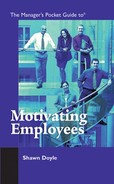Breaks
There is every indication that when people take breaks (vacation, days off, holidays), they come back to work refreshed, motivated, and much more productive. Yet I have been in many work environments where people never took breaks.
In many organizations, people are in early, leave late, and eat lunch at their desk. This might be okay if a company has an urgent project in the short term, but as a regular practice, it is a good way to burn employees out. For employees to maintain motivation and energy, they must have breaks. Managers must foster and encourage employees to take breaks and to get out of the office and away from their desks. This accomplishes two objectives: It gives employees a break and shows the employee that the manager cares and is paying attention.
I have seen many companies where employees take their laptops on vacation so that they can check e-mail every night. They also call in and check their voice mail each day. I think it is a disgrace to ask employees to do that. Managers who cannot have their team members take off an uninterrupted week are poor managers. There should always be someone who has been trained to fill in for the vacationing employee.
I have managed employees on my teams, and when they went on vacation, there were two rules: (1) They were not allowed to take their laptops and (2) they were not allowed to call in for messages. I would tell them that calling in and checking e-mail defeated the purpose of vacation, which was to vacate. When I went on vacation later that year, they held me to my own rule! I came back with “batteries recharged” and ready to go. Here is what economist John Kenneth Galbraith had to say about vacations: “Total physical and mental inertia are highly agreeable, much more so than we allow ourselves to imagine. A beach not only permits such inertia but enforces it, thus neatly eliminating all problems of guilt. It is now the only place in our overly active world that does.”
One method that managers can employ is the technique of unexpected time off, which can be very effective. The manager would simply go into the employee’s office or work space, and tell them that they have done a great job and have worked very hard. Next tell them to take the next day off with pay and without it counting toward vacation days. It is in essence a free day. This is even more effective if the free day is a Friday or a Monday because it creates a three-day weekend. It works well as a motivating tool because of the element of surprise, and it works because it forces the employee to take some time off.
Modeling Balance
